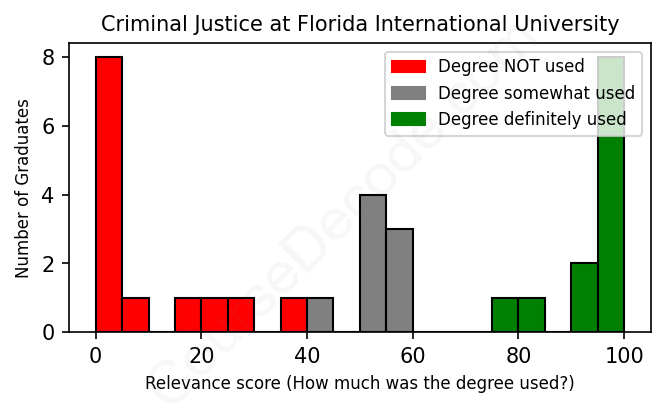
First, some facts. Of the Criminal Justice graduates from Florida International University we've analyzed , here's how many have used (or NOT used) their degree in their career:

These are estimates based on AI analysis of 33 LinkedIn profiles (see below).
The verdict? Significantly below average. Overall, with an average relevance score of 50%, Criminal Justice graduates from Florida International University have a much lower likelihood (-17%) of finding work in this field compared to the average graduate across all fields:
And for comparison, here's the chart for all profiles we've looked at across all degrees.
Also, after graduating, only 30% of these graduates have pursued further education other than another Bachelor's degree (such as a Masters degree or other), compared to the average across all profiles of 35%. This suggests a Bachelors degree is enough for most Criminal Justice graduates, and it's normal to look for work straight after graduation.
See the details:
|
Relevance score: 100% We think this person has gone into a career highly relevant to their degree. We think this person has gone into a career highly relevant to their degree.
DEGREE INFOGraduated in 2013 from Florida International University with a Bachelor of Science (B.S.) in Criminal Justice. Also pursued further education since (see below). JOB HISTORY SINCE GRADUATIONIntern Miami Beach Police Department Jan 2013 - Apr 2013 Security Lieutenant  G4S 2013 - 2015 Certified Police Officer  Law Enforcement Agency/Government Oct 2015 - Present FURTHER DEGREES DONE SINCE GRADUATINGCertificateMiami Police Training Center 2013 - 2014 ABOUTDedicated individual seeking a position in Law Enforcement and an opportunity to protect and serve the community. |
The top 10 most common jobs done by the graduates we've analyzed (ranked most common to least) are:
From the analyzed LinkedIn profiles of graduates with a Criminal Justice degree from Florida International University, it's clear that there's a wide range of job roles these individuals have taken on. Many graduates have found positions in directly related fields such as law enforcement, legal assistance, and roles within various levels of government. Notable examples include positions like Deputy Sheriff, Police Officer, and Child Protective Investigator, which directly utilize criminal justice principles and practices. On the flip side, there are quite a few graduates employed in roles that do not make use of their degree's skills or knowledge, such as restaurant managers, servers, or internal support roles in non-criminal justice contexts.
Overall, while several graduates have successfully secured positions that are relevant to their Criminal Justice studies, a significant number find themselves in jobs that might not fully leverage their education. Many roles—like customer service, sales, and administrative positions—lack a direct link to the principles of criminal justice. This indicates a mixed bag of outcomes for graduates, where some are thriving in their fields while others are working in jobs that bear little relevance to their studies. It’s a real reminder that having a degree doesn't always guarantee a job in the field of study, and it’s essential for students to be open to various opportunities that may not directly align with their major.
Here is a visual representation of the most common words in job titles for Criminal Justice graduates (this is across all Criminal Justice graduates we've analyzed, not just those who went to Florida International University):

When looking at the career trajectories of graduates from Florida International University with a degree in Criminal Justice, it's pretty clear that many of them start their professional journeys in positions that are closely tied to the field. A lot of recent graduates land roles like legal assistants, deputy sheriffs, or probation officers right out of college, which shows they're stepping straight into relevant jobs. For those with a few years of experience, you see them advancing into specialized roles such as fraud detection analysts, mental health coordinators, and law enforcement positions. It looks like they’re building strong careers within the justice system or related sectors, which is definitely a positive sign.
Fast forward five to ten years, and it’s interesting to note the mix of paths people take. Some stay in law enforcement, moving up the ladder to roles like police officer or deputy sheriff, while others branch out into related fields such as legal work, compliance, or even education. However, there are also graduates who veer off into completely unrelated jobs, like those who became marketing managers or account executives. Overall, it seems like a solid number of individuals are making meaningful contributions to the criminal justice field, while there’s a smaller subset exploring paths outside the typical Criminal Justice trajectory. All in all, while there are a few twists and turns, many grads from FIU are finding their way into rewarding careers that reflect their education and interests.
Getting a Bachelor’s degree in Criminal Justice at Florida International University is generally considered to be on the easier side compared to some other majors, but that doesn’t mean you can coast through it. You’ll definitely have your fair share of reading, writing papers, and participating in discussions about crime theory, law enforcement practices, and the legal system. It might feel pretty manageable if you enjoy the subject matter, but there are definitely some challenging classes and key concepts you'll need to grasp. Overall, if you stay organized and are genuinely interested in criminal justice, you should find it to be a pretty smooth journey.
Most commonly, in the LinkedIn profiles we've looked at, it takes people 4 years to finish a Bachelor degree in Criminal Justice.
Looking at the job paths of these Florida International University criminal justice grads, it seems like a mixed bag in terms of earning potential. Some of them have landed pretty solid positions, like those in law enforcement or legal roles, which typically pay decent salaries—like Deputy Sheriffs, Special Agents, or even roles like Fraud Operations Manager that can go up over time. Others seem to be starting off in more entry-level positions or have job titles that might not scream 'big bucks,' like various secretarial or assistant roles. It’s clear that some of these paths can lead to a good salary with experience and advancement, while others might not bring in the big money right away. So, overall, it seems like if they’re strategic and climb the ladder, they could end up doing pretty well!
Here is a visual representation of the most common words seen in the "about" section of LinkedIn profiles who have a Bachelor degree in Criminal Justice (this is across all Criminal Justice graduates we've analyzed, not just those who went to Florida International University). This may or may not be useful:

Here are all colleges offering a Bachelor degree in Criminal Justice (ordered by the average relevance score of their Criminal Justice graduates, best to worst) where we have analyzed at least 10 of their graduates: